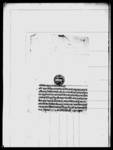A rukkā from the king granting Prime Minister Jaṅga Bahādura Kũvara allowances previously enjoyed by Bhimasena Thāpā (VS 1903)
ID: DNA_0015_0091
Edited and
translated by Rajan Khatiwoda
in collaboration with
Rabi Acharya and Astrid Zotter
Created: 2016-10-04;
Last modified: 2018-03-28
For the metadata of the document, click here
The accompanying edition, translation/synopsis and/or commentary are available under the terms of the Creative Commons Attribution-ShareAlike 4.0 International License
Abstract
This rukkā from the king grants allowances previously enjoyed by General Bhīmasena Thāpā to Prime Minister Jaṅga Bahādura Kũvara. These allowances include non-monetary items—channelled through the Tosākhānā, the Koṭa Bhaṇḍāra and other offices—that are required of subjects on the occasion of the Dasaĩ and Phāgu festivals.Diplomatic edition
[1r]
1श्रीदुर्गाज्यूः\[royal seal]1स्वस्तिश्रीमन्महाराजाधिराजकस्यरुक्का¯ ¯ ¯ ¯ ¯ ¯ ¯ ¯ ¯ ¯ ¯2आगे•प्राइम्मिनिष्टरयानकम्यांडरइनचिफ्जनरलजङ्गवहादुरकुँव़रके
3अघिजनरलभीमसेनथापालेदर्वारवाटपायावमोजिम्•तोसाषानाकोटभ
4डारअरुजगाजगावाटजान्याषान्यापिन्यासराजाम्कपडालत्तादसैफा
5गुकामामुलीदैदस्तुरगैर्हसवैवहालगरिवक्स्यौंआफ्नाषातिरजामा
6सित•हाम्रानिमक्कोसोझोचिताइजनरलभीमसेनथापालेषाइपाइ
7आय़ावमोजिम्•तोसाषानाकोटभडारजगाजगावाटषान्यापिन्यासराजा
8मकपडालत्तादसैफागुकामामुलीदैदस्तुरगैर्हसवैवेलावेलामालीभो
9ग्यगरइतिसम्वत्१९०३सालमितिमार्गवदि५रोज१शुभम्¯ ¯ ¯
Translation
Venerable Durgā
[royal seal]
Hail! [This is] an executive order (rukkā) of the supreme king of great kings.1
Āge: To the Prime Minister and Commander-in-Chief General Jaṅga Bahādura Kũvara.
We have assigned [to you] everything that was previously received from [our] court (darabāra) by General Bhīmasena Thāpā and went through the [Kausī] Tosākhānā, Koṭa Bhaṇḍāra and other places, [including] food and drink, dress, usual obligations (māmulī) and customary fees (daidastura) [delivered by the subjects] during the Dasaĩ and Phāgu festivals. Being loyal to our salt and mindful of your duty, enjoy everything, [including] food and drink, dress, usual obligations and customary fees [delivered by subjects] on Dasaĩ and Phāgu that were enjoyed (lit. "eaten and received") by General Bhīmasena Thāpā, collecting them from time to time from theTosākhānā, Koṭa Bhaṇḍāra and other such places.
Sunday, the 5th day of the dark fortnight of Mārga in the [Vikrama] era year 1903 (8 November 1846 CE). Auspiciousness.
Commentary
By this executive order Jaṅga Bahādura is granted privileges previously enjoyed by Bhīmasena Thāpā, and that, strangely enough, more than seven years after the latter's death in 1839 (on Bhīmasena’s end, see Acharya 1971: 15; Adhikari 1984: 22). This series of entitlements were steps along the way to Jaṅga Bahādura's empowerment after the Koṭa Massacre on 14 September 1846 (see n. 1). In a multi-step process, rights and titles were transferred to Jaṅga Bahādura Kũvara, while the reigning Śāha king Rājendra and his heir Surendra were deprived of their power to govern the country. Another lālamohara issued on the same day, appointed Surendra prince regent (Pandey 1973: 50; cf. n. 1). Strangely, Acharya (1971: 25) has translated a document issued by King Rājendra appointing Jaṅga Bahādura as Prime Minister in VS 1903 on the 10th of the dark fortnight of Mārga, while in the present document, issued five lunar days before that, he is already addressed as the prime minister.

